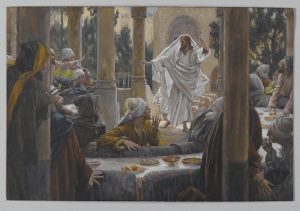HOMILY SUNDAY 22-B
First Fruits of all Creation
(Dt 4:1-2, 6-8; Ps 15; James 1:17-18, 21-22, 27; Mk 7:1-8, 14-15, 21-23)
*************************************************************
Some years back, two American Dominican sisters realized their dream of serving in a mission. There was much excitement as they packed up and prepared to move to a community in northern Saskatchewan as pastoral workers.
In the second reading today, we see St. Paul inviting us to set out on a new venture. In his words, God gave us birth by the Word of Truth, so we would be the first fruits of God’s creation. Being the first fruits of a new creation is an exciting venture. We are invited to be part of a new creation by believing in Jesus and living his law of love
That new venture is rooted in the experience of the Israelites in the desert after their escape from slavery in Egypt. At Mt. Sinai, through Moses, they are given the Decalogue, the Law, the Ten Commandments and become a new people of the covenant with a mandate to live a new way of life as the People of God, the Chosen ones.
 Unfortunately, they fell prey to the all-too common temptations that Jesus faced in the desert – to put their faith in possessions, prestige and the selfish use of power. Throughout their history, they craved for and grasped at obtaining Land, King and Temple so they could be like the other nations. These are not bad things in themselves. The problem is these temptations became the means by which they started to measure what they thought was their holiness. Their notion of religion turned the Law into human traditions and legalism exhibited especially by the scribes and Pharisees and how they carried out their faith in God. As Jesus put it so succinctly, “their hearts are far from me, and they teach human traditions as doctrines.”
Unfortunately, they fell prey to the all-too common temptations that Jesus faced in the desert – to put their faith in possessions, prestige and the selfish use of power. Throughout their history, they craved for and grasped at obtaining Land, King and Temple so they could be like the other nations. These are not bad things in themselves. The problem is these temptations became the means by which they started to measure what they thought was their holiness. Their notion of religion turned the Law into human traditions and legalism exhibited especially by the scribes and Pharisees and how they carried out their faith in God. As Jesus put it so succinctly, “their hearts are far from me, and they teach human traditions as doctrines.”
Jesus invites us to go beyond rules and regulations to be part of a new creation based on spirit and love. This happens through forgiveness of our sins (fornication, theft, murder, adultery, slander) and healing of our defects of character (avarice, wickedness, deceit, licentiousness, envy, pride, folly). This new way of life is based on both forgiveness and healing.
In the second reading, St. Paul continues to describe real religion as genuine compassion and charity, as well as personal holiness and healing.
Reinhold Niebuhr, Lutheran theologian who conceived the Serenity Prayer, has this to say about this new creation:
“Nothing that is worth doing can be achieved in our lifetime, therefore we must be saved by hope. Nothing that is true or beautiful or good makes complete sense in any immediate context of history, therefore we must be saved by faith. Nothing we can do, however virtuous, can be accomplished alone, therefore we are saved by love. No virtuous act is as virtuous from the standpoint of our friends or foes as it is from our standpoint, therefore we must be saved by the final form of love which is forgiveness.”
The Eucharist we celebrate today is the heart of our Sacred Tradition that helps transform us into the Body of Christ and empowers us to live the commandment to love the world.
So, let us put our faith in Jesus, live his law of love, and we will be part of his new creation.



